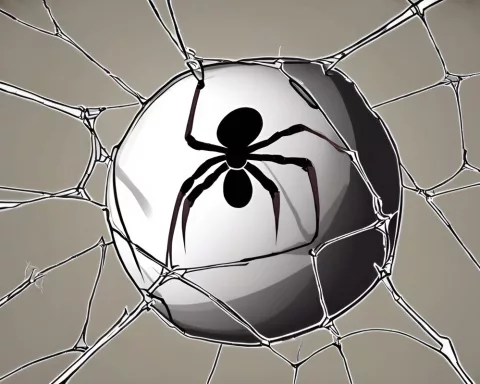Tom Foley’s sudden retirement from rugby due to online abuse has created a stir in the sports world. This issue is not just limited to rugby, as other rugby personalities have also faced death threats on social media. The seriousness of this situation cannot be ignored, and immediate action is imperative to prevent players and referees from leaving the sport due to cyberbullying. The mental health and safety of athletes must be protected, and this issue must be viewed as a wake-up call for the sports industry.
Tom Foley’s unexpected retirement from rugby has drawn attention to the impact of online abuse in sports. Foley, a match official and TMO for the Rugby World Cup final, received death threats on social media, as did other rugby personalities. The seriousness of this problem cannot be ignored, and immediate action is necessary to prevent players and referees from leaving the sport due to relentless harassment from online tormentors.
In a move that has stunned the rugby universe, Tom Foley, a highly respected match official and Television Match Official (TMO) for the Rugby World Cup final, announced his unexpected retirement recently. A constant barrage of online harassment played a key role in his decision, highlighting a deeply troubling trend plaguing the world of sports.
Foley, who is only 38 years old, had revealed last month that his family and he had received death threats in the aftermath of the World Cup. This shocking disclosure resulted in him alerting his children’s school, as a security measure. It drives home the harsh reality that the repercussions of online hate can indeed manifest as real-world dangers.
Impact of Online Abuse in Sports
Foley’s announcement reverberated through the rugby community when Wayne Barnes, the referee who officiated the World Cup final in October, also decided to hang up his boots last month. He acknowledged the constant barrage of online abuse as a significant factor, revealing that his family had also been subjected to death threats.
England rugby team’s captain, Owen Farrell, opted to distance himself from international rugby, giving precedence to his and his family’s mental well-being over the sport. Farrell’s decision, influenced by ongoing internet abuse and exhaustion, is a potent reminder that even the toughest athletes can fall prey to the damaging impacts of cyberbullying.
These incidents spotlight a rampant issue not restricted to rugby but prevalent across the sports industry. Given the seriousness of this problem, it can no longer be dismissed or overlooked. Immediate action is crucial as it could potentially prevent an exodus of players and referees, who might refuse to tolerate the relentless harassment from online tormentors.
Athletes Raise Concerns About Online Threats
Cobus Reinach, the star of the Springbok, also exposed this grim reality during the World Cup. He shared his distressing experience of being labelled a cheat and receiving death threats aimed at his family. A terrifying message delivered to Reinach eerily echoed the hatred confronted by Foley and Barnes, comprised of a death threat and a menacing image captioned, “Go die.”
Despite these worrying trends, England prop Kyle Sinckler suggests that this might just be the beginning. He argues that the physical and psychological strain on international athletes may lead to more sportspeople emulating Farrell’s move of withdrawing from international games.
Speaking to the BBC, Sinckler said, “If I’m being honest, it’s only the beginning. If you look at the workload the players go through, especially the international players…I wouldn’t be surprised to be honest if more players did the same.” He spoke eloquently about the cyclical nature of praise and criticism that forms an intrinsic part of their profession, emphasising the need for players to stand their ground against adversity.
The Future of Sports in the Age of Online Harassment
However, the pressing question is – for how long can they hold their ground? The narrative of online abuse and its ramifications are a harsh reminder of the urgent action required to protect the mental health and safety of athletes, for the love of the sport and the individuals behind the sportspeople. This escalating crisis can no longer be treated as an unpleasant by-product of fame and success. Instead, it must be viewed as a clarion call for all stakeholders in the sports industry.
1. What led to Tom Foley’s retirement from rugby?
Tom Foley retired from rugby due to online abuse, including death threats on social media.
2. Has this issue affected other rugby personalities?
Yes, other rugby personalities have also faced death threats on social media.
3. Why is immediate action necessary to prevent players and referees from leaving the sport?
Immediate action is necessary to prevent players and referees from leaving the sport due to cyberbullying, which can have a serious impact on their mental health and safety.
4. What impact has online abuse had on other athletes?
Other athletes, such as Owen Farrell and Cobus Reinach, have also been subjected to online abuse, leading to concerns about their mental well-being and physical safety.
5. Could more athletes withdraw from international games due to online abuse?
England prop Kyle Sinckler believes that more athletes may withdraw from international games due to the physical and psychological strain of being an international athlete.
6. What needs to be done to address this issue in sports?
Immediate action is needed to protect the mental health and safety of athletes, and to prevent the exodus of players and referees from the sport. This issue must be viewed as a wake-up call for the sports industry, and all stakeholders need to take action to address the problem of online abuse.












